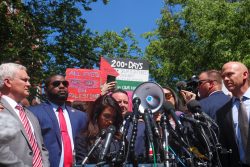Georgetown student Kate Dieringer (NUR ‘04) filed a complaint in early February with the Department of Education alleging that Georgetown violated her civil rights as a sexual assault victim.
Dieringer reported to the Office of Student Conduct in April 2002 that she had been drugged and raped in the fall of 2001. According to Dieringer, when she went to Director of Student Conduct Judy Johnson to learn the results of her assailant’s adjudication process, she was told she had to sign a confidentiality agreement in order to discover the outcome.
Dieringer said that she was led to believe that the Family Educational Rights and Privacy Act, a federal law designed to protect the confidentiality of students’ records, mandated the confidentiality agreement. FERPA, however, legally permits universities to disclose the results of judicial procedures. The confidentiality agreement is a Georgetown policy and violating the agreement is punishable by sanction.
The complaint states that Dieringer’s rights were denied under the federal “Campus Sexual Assault Victim’s Bill of Rights,” a portion of the Jeanne Clery Act, a federal law passed in 1990 and amended in 1998. The Clery Act requires that universities provide victims with the outcome of the adjudication process unconditionally, according to the Security on Campus newsletter.
Dieringer said that she spoke Wednesday with James Moore, the person handling the complaint at the Department of Education.
“He told basically told me that what Georgetown is doing is illegal, that it is violating federal law,” she said.
She said that the goal of the complaint is to abolish Georgetown’s confidentiality agreement so “the revictimization of victims will no longer occur.”
Security on Campus, a non-profit organization, has been working with Dieringer since August to determine the best way to combat Georgetown’s policy, said Daniel Carter, a victims’ rights advocate with the organization.
Security on Campus has filed a brief with the Department of Education in support of Dieringer’s complaint.
Carter said that a civil complaint has been filed with the Philadelphia regional DOE which has jurisdiction over institutions of higher education. He said he hopes the DOE will evaluate the complaint and take action immediately by contacting Georgetown.
According to Carter, there has been no response from the Georgetown.
University spokeswoman Gloria Lacap stated that Georgetown will continue to comply with University and federal policies.
“Georgetown University takes very seriously both the safety and well-being of all of its students and its responsibility to protect the privacy of student records. We are committed to maintaining the confidentiality of our student disciplinary system in full compliance with all applicable University policies and federal requirements,” Lacap said.
Carter said that a small victory has been won in the form of a clarification of some of the “ambiguous” aspects of FERPA that Carter said he feels mislead sexual assault victims.
In response to an October letter from Carter, LeRoy S. Rooker, director of the Family Policy Compliance Office of the DOE, wrote to Carter, “When an institution determines that an accused student is an alleged perpetrator and has violated the institution rules, then there are no restrictions on disclosure or redisclosure of the final results of a disciplinary hearing.”




